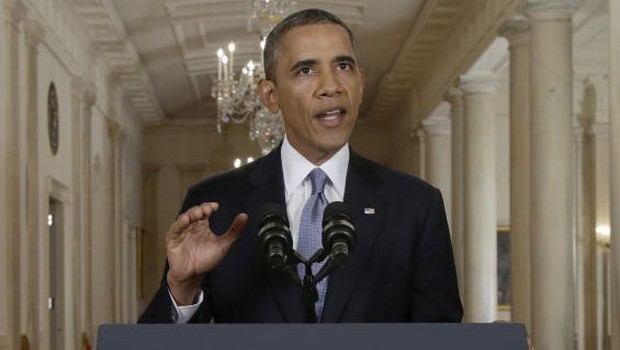
FILE – In this Sept. 10, 2013 pool-file photo, President Barack Obama addresses the nation in a live televised speech from the East Room of the White House in Washington. (AP Photo/Evan Vucci, Pool-File)
Those sentences are the clearest articulation yet by American President Barack Obama of his administration’s core policy in Syria. In a speech on Syria last night, slated to be an address to the American people but with the world listening, Obama explained his true priorities in the Middle East. The reality is that as long as the American military, American core interests and Israel are safe, the United States has no interest in getting involved in the Syrian crisis. The message would have been well received in Damascus.
These are Obama’s true ‘red lines’ that have guided Syrian President Bashar Al-Assad and his government in dealing with the Obama administration, and making sure ‘regime change’ does not get onto the White House’s agenda. When Israel struck Syria, Assad’s military—which has proved itself capable of incredible destruction—did not let out a whimper despite decades of rhetoric from the government of ‘resistance.’ Survival has been one of the hallmarks of this regime as it uses brute force within its own boundaries and sleek politicking abroad.
Obama’s calculation is that “neither Assad nor his allies have any interest in escalation that would lead to his demise.” It appears that the United States also has no interest in such an escalation, nor necessarily in Al-Assad’s demise. When Kerry was asked in Monday’s press conference in London what action the Syrian government could take, the old policy of ‘Assad must go’ was not noted as a top priority.
Instead, Al-Assad was given a lifeline if he “could turn over every single bit of his chemical weapons to the international community in the next week. Turn it over, all of it, without delay, and allow a full and total accounting for that.” The next 24 hours witnessed a flurry of diplomatic activity centered on Moscow, not Washington, or even New York.
Meanwhile, the world watches the suffering of the Syrian people, caught in a grinding war between merciless groups intent on destruction, with the position of supporters of peace and voices of reason growing ever weaker. While every politician speaks of this suffering, in reality, over 120,000 deaths and more than 6 million displaced Syrians are not seen as enough of a threat to force effective action—military or diplomatic.
Moreover, the message from Obama to the countries of the Middle East is that “our ally, Israel, can defend itself with overwhelming force, as well as the unshakable support of the United States of America.” While the United States is of course interested in safeguarding its other allies in the region, like Jordan and Turkey, they do not have the ‘unshakable’ support that can be counted on as the flames of instability and militancy spread in the region.
However, as Obama’s address was given on the eve of the 12th anniversary of the September 11 attacks, it is important to keep in mind the possible consequences of ignoring a festering problem in another part of the world because it seems either irrelevant or too difficult. The rise of militancy in both Syria and Iraq—with a border that has become a new safe haven for Al-Qaeda—is one more reason for a more coherent American strategy for Syria.
It has been clear that Obama does not want to be dragged into a war in Syria, and he has made it clear that military options are very limited. Military strikes, ‘pinpricks’ or otherwise, are never a positive development. Yet the implications of a ramping-up of rhetoric followed by an inexplicable display of hesitation that allowed Russia to take the lead on the most pressing international crisis will be long felt in the Middle East and beyond.
This article originally appeared in The Majalla.
